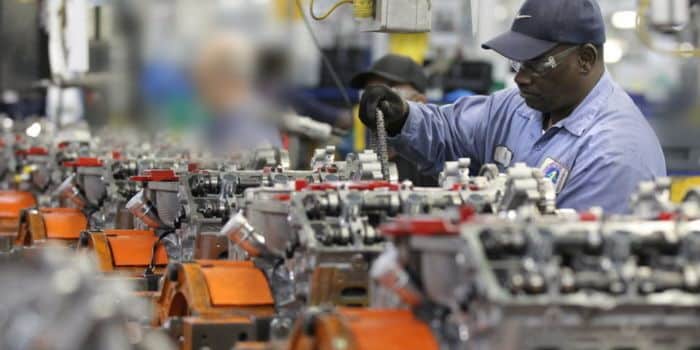[ad_1]
The manufacturing industry in Kenya is one of the sectors in the country that is bearing the brunt of unpredictable tax policies instituted in the past two years.
According to a report by Bloomberg, approximately 60% of manufacturing companies in Kenya have halted their expansion plans as they await the government to announce the next budgeting cycle.
“One of the major issues is unpredictable tax and policy,” Kenya Association of Manufacturers acting Chief Executive Officer Tobias Alando told Bloomberg.
“We have a scenario where every new fiscal year, every new budget period, we see taxes imposed in the budget that are affecting manufacturing, particularly affecting inputs.”
President William Ruto hosting a meeting with stakeholders in the manufacturing industry on March 12, 2024
PCS
Additionally, most of these companies have reported to be operating at half their capacity due to the taxes and government policies that have reduced competitiveness and purchasing power.
In the two years President William Ruto has been in office, the purchasing managers’ index has fallen to 48.9, which is below the 50 threshold separating expansion from contraction.
These factors have led the manufacturing industry’s contribution to the GDP to stunt at just over seven per cent in the last three years and the growth to stagnate at two per cent in 2023.
The last time the industry’s contribution to gross domestic product was in double-digits was in 2015, coming in at 10%.
High taxation on household items has been one of the biggest contributors to the low consumer purchasing power in the country with some of the basic goods’ prices multiplying over the past few years.
Compared to the neighbouring countries, for instance, electricity in Kenya costs 70 per cent more due to the additional levies.
This trend has not gone unnoticed by Kenyans however. In June 2024, the youth took to the streets to protest against the Finance Bill 2024 which proposed a mammoth of taxes and policy changes they found oppressive.
The protests quickly turned deadly with roughly 60 Kenyans having lost their lives at the hands of anti-riot police officers.
The consequences of the increased taxation on several manufactured goods like oil, alcohol, and pharmaceuticals have also led to some major multinationals pulling out of the Kenyan market. About 32 companies were reported to be dissolving their operations in the country just three months ago.
In October, the country imposed a 10 per cent import duty on crude oil across the East African Community affecting not only the 80,000 employees who depend on such jobs but also millions of Kenyans who depend on the 13 edible oil companies.
The green ammonia manufacturing plant in Naivasha.
Photo
E360 Digest
[ad_2]
Source link
